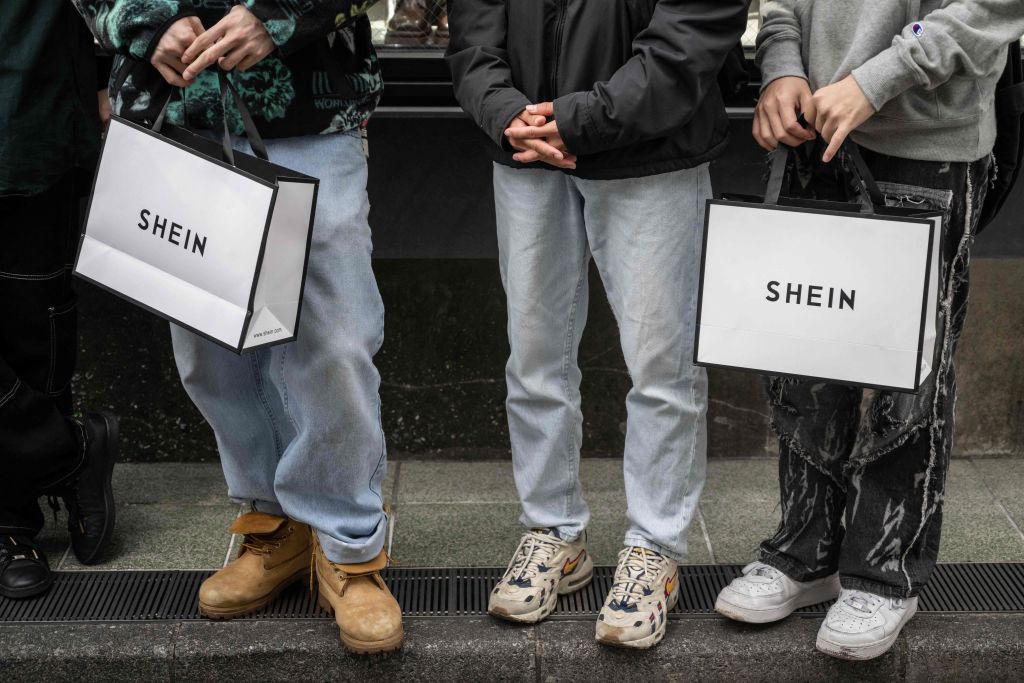Fast-fashion giant Shein finds itself under a heightened regulatory spotlight as the European Union tightens online content rules, designating the Chinese-founded company as a Very Large Online Platform (VLOP).
According to a statement released by the EU on Friday, Shein’s rapidly growing user base has surpassed the threshold of 45 million users, triggering the classification as a VLOP under the Digital Services Act (DSA) (via Reuters).
(Photo : YUICHI YAMAZAKI/AFP via Getty Images)
People holding Shein shopping bags stand outside the first permanent showroom of Chinese online fast fashion giant Shein on the opening day of the shop in Tokyo on November 13, 2022.
What Is a VLOP?
VLOPs like Shein now face stricter regulations aimed at combating illegal and harmful content, as well as counterfeit products on their platforms.
Specifically, the EU Commission is asking Shein to address specific risks related to illegal content and products on its platform. Additionally, Shein must submit risk assessment reports to the Commission every year.
Additionally, Shein is required to strengthen internal processes, resources, testing, documentation, and supervision of risk detection activities.
This move is consistent with the EU’s overall efforts to improve consumer protection and safety on the Internet. Companies subject to the DSA, including tech giants such as Amazon, Apple, and Alibaba, are tasked to provide the same requirements.
Speaking to the press, Leonard Lin, Shein’s global head of public affairs, affirmed the company’s commitment to complying with the new regulations, emphasizing the shared goal of fostering consumer trust and safety in online shopping.
Shein, which expanded its presence in the EU marketplace in August of the previous year, now operates within the regulatory framework of the DSA, which came into effect on February 17 (Reuters).
Non-compliance with the DSA can result in significant penalties, with fines of up to 6% of a company’s global turnover.
Read Also: EU Launches Probe Into Alibaba’s AliExpress Over Illegal Content
Shein’s Rapid Growth
The company, which uses Facebook, Instagram, Pinterest, and TikTok to promote its products, has forged partnerships with hundreds of influencers, with some offered trips to China, and employs targeted promotional campaigns to engage consumers effectively.
Additionally, Shein’s marketing strategy relies heavily on offering promotions and incentives to attract and retain customers, with new users often receiving multiple offers upon joining the platform.
Shein’s algorithm-driven supply chain enables it to introduce thousands of new items to its site every week, staying ahead of fashion trends and offering products at competitive price points.
Business of Apps tells us that Shein’s valuation has experienced a meteoric rise in recent years, reaching $100 billion in early 2022 before declining to $64 billion in 2023.
However, Shein’s ascent to prominence has not been without controversy. The company faces allegations of labor rights violations, environmental concerns, and intellectual property disputes, casting a shadow over its rapid growth and market success. In response, Shein is taking steps to address these issues, particularly in anticipation of a potential initial public offering (IPO).
Stay posted here at Tech Times.
Related Article: EU Pressures ByteDance to Provide More Information on TikTok Lite’s Launch in France, Spain
ⓒ 2024 TECHTIMES.com All rights reserved. Do not reproduce without permission.

